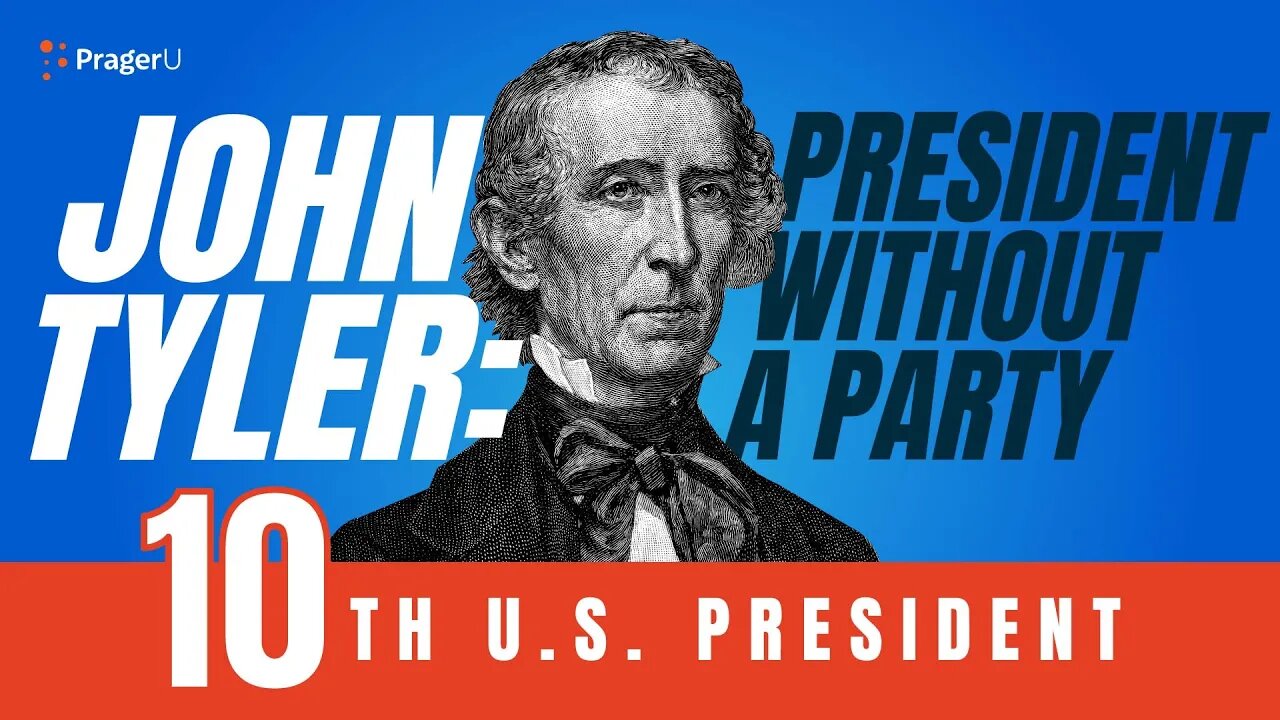Premium Only Content

John Tyler: President without a Party
The year was 1841. No president had ever before died in office. And then one did. Who would take over as chief executive? The Constitution was surprisingly vague on this question — until Vice President John Tyler took a firm stance. His actions changed the direction of American history. Jared Cohen, author of Accidental Presidents: Eight Men Who Changed America, tells Tyler’s little-known story.
Watch PragerU's American Presidents series: https://l.prageru.com/3IjUsLU
SUBSCRIBE 👉 https://www.prageru.com/join
Script:
A loud, persistent rapping woke United States Vice President John Tyler out of a sound sleep.
Clad in his sleeping frock and a cloth hat, an irritated Tyler opened the door. Two young men stood before him.
One of them handed the Vice President a document.
Tyler broke the seal and read.
“My God, the President is dead.”
The president was William Henry Harrison. He had been in office for only 31 days.
In America’s short history, this had never happened before. And no one, including the Vice President, was quite sure what to do.
It was April, 1841.
John Tyler, tall, thin, with an aquiline nose and regal bearing, was the quintessential southern gentleman. A long-time fixture in Virginia politics, he had served both as governor and senator. When Harrison, who was looking for someone to shore up his Southern base, offered him the VP slot, Tyler felt duty bound to accept.
The two men rode to an easy victory on the catchy slogan — one of the most memorable in presidential politics — “Tippecanoe and Tyler, too.” (“Tippecanoe” referred to Harrison’s 1811 victory over hostile Indians at the Tippecanoe River in Indiana.)
On March 4, 1841, Harrison gave a rambling two-hour inauguration speech on a cold, rainy afternoon. Soon after, Tyler left town and returned to his plantation. He figured he could be vice president there just as well as he could in Washington, and a lot more comfortable.
It was at Tyler’s plantation that the messengers had delivered their fateful news.
When Tyler arrived in the nation’s capital, the only person who assumed that he was now president was Tyler.
Here’s why:
Article II of the Constitution reads as follows: “In Case of the Removal of the President from Office, or of his Death, Resignation, or Inability to discharge the Powers and Duties of the said Office, the Same shall devolve on the Vice President.”
What does that mean?
It could easily mean that the Vice President was just a placeholder until a new President could be chosen by Congress or by a special election. That’s what John Quincy Adams the former President and now Massachusetts congressman believed. And many agreed with him.
Tyler took a decidedly different view.
If possession is nine-tenths of the law. Tyler had possession. And he wasn’t going to let go.
Thus, an historical precedent was forever established: in the event of the death of the President, the Vice President serves out the remaining term. We take this smooth transition for granted now, but only because of what Tyler did.
His first crisis solved, he immediately stepped into another.
Tyler was a member of the Whig Party. The Whigs were formed to oppose the Democrats which had been created and dominated by the seventh President of the United States, Andrew Jackson. The big issue for the Whigs was the establishment of a national bank which they saw as a way to get cheap credit to farmers to finance westward expansion. The Democrats, taking their lead from Jackson, hated the idea of giving power to what they believed were corrupt New York money interests.
Tyler, even though he was Whig, disliked the idea of a national bank as much as Jackson did. When Congress, then dominated by the Whigs, passed a national bank bill, Tyler vetoed it — twice. The Whigs were so incensed, they kicked Tyler out of the party.
By his second year in office, he was a President without a party.
One could fairly ask, why, if Tyler opposed the National Bank, was he Whig at all. The answer reveals both the strength and weakness of that party. The strength was that it was catch-all for anyone who didn’t like the Democrats — this included, oddly enough, both Northern abolitionists and Southern slave-owners like Tyler. Abraham Lincoln, it should be remembered, was elected to Congress as a Whig. The weakness of the party was that it had no unifying platform. No two members could agree on any one thing — except that they hated the Democrats, of course.
Tyler thought he could use this confusion to his advantage to win a second term. His plan depended on achieving one enormous goal, bringing the Lone Star Republic of Texas into the United States. Texas, Tyler believed, would unite Whigs who favored westward expansion and Southern Democrats who liked the idea of adding a new slave state.
For the full script, visit: https://www.prageru.com/video/john-tyler-president-without-a-party
-
 4:29
4:29
PragerU
2 days agoMichael Knowles: This Book Changed My Life | Short Clips | PragerU
5.63K2 -
 1:03:22
1:03:22
IsaacButterfield
8 hours ago $2.35 earnedKaty Perry in Space?! Trans Women Law Controversy & Lizzo's Weight Loss Shocks Fans!
31.3K3 -
 LIVE
LIVE
Sm0k3m
5 hours agogaming night
316 watching -
 DVR
DVR
I_Came_With_Fire_Podcast
13 hours agoHOUTHIS & CHINA | MURDERER MERCH STORE | TRUMP SICK OF WAITING
33.4K5 -
 1:09:15
1:09:15
Keepslidin
3 hours ago $0.51 earnedIRL GAMBLING & GIVING PEOPLE MONEY WHEN THEY WIN
17.5K3 -
 LIVE
LIVE
Eternal_Spartan
14 hours agoLive at 9pm Central | Halo 3 & Halo Firefight! Come Hang out with a USMC Vet and join the best chat!
181 watching -
 4:06:20
4:06:20
VapinGamers
5 hours ago $1.40 earnedFortnite Friday - Game Night with the Family - !brian !rumbot
27.4K5 -
 59:22
59:22
Motherland Casino
3 hours ago $1.12 earnedScar x Ayanna
13.5K10 -
 53:30
53:30
Sarah Westall
7 hours agoLingering IRA Scandal, Central Banker’s Criminal Dilemma and the Silver Squeeze w/ Andy Schectman
49.8K7 -
 1:10:36
1:10:36
Edge of Wonder
10 hours agoWhite House: ‘We Can Manipulate Time and Space’
52K21